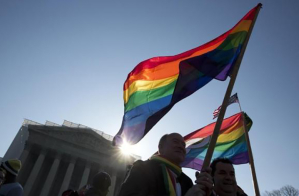
On its first day back in session on Monday, the U.S. Supreme Court managed to blindside those on both sides of the issue by handing down a non-decision on homosexual marriage. The high court declined to hear appeals from five U.S. states seeking to uphold existing bans, and true to character, offered no explanation. Essentially, the justices' refusal to hear each case paved the way for homosexual marriage in Indiana, Oklahoma, Utah, Virginia, and Wisconsin, as well as in other states with similar bans in the fourth, seventh and tenth circuits.
The decision comes almost 18 months after the Supreme Court struck down section three of the Defense of Marriage Act - commonly referred to as DOMA - which defined marriage as a union between a man and a woman. In June 2013, a 5-4 decision in United States v. Windsor gave homosexual couples in a state recognizing their union complete eligibility to receive the same federal benefits as their heterosexual counterparts. DOMA was signed into law in September 1996 by President Bill Clinton.
While some are calling this a win for homosexual unions, Tony Perkins, president of the Family Research Council, says the Supreme Court's inability to make a decision is proof that they are not ready to divide the nation be redefining marriage in every state. The Washington, DC-based organization works to enact change by addressing cultural issues from a Christian worldview.
"If the Supreme Court thinks America isn't ready for same-sex 'marriage,' they're right," Perkins wrote on Monday. "As more states are forced to recognize it, people will see the ensuing attacks on religious freedom."
Proponents of homosexual marriage had been hopeful of a Supreme Court ruling that would finally settle the issue in their favor. What the decision did was increase the number of U.S. states allowing homosexual marriage from 19 to 24 - along with the District of Columbia - and ultimately, leaves the matter in limbo for remaining states.
The news prompted some homosexual couples in affected states to head to their local court house to enter into now lawful unions. The high court's choice to take the path of least resistance made unions which had previously been on hold in the five states instantly legal. Some homosexual couples were walking away with a marriage license within hours of Monday morning's ruling.
A Supreme Court decision on a hot button issue does not guarantee an end to public debate. Its 1973 ruling legalizing abortion nation-wide failed to calm arguments between opposing groups, and four decades after the Roe v. Wade decision, abortion fights continue.
Even in its surprising ruling, the Supreme Court exhibited its own inability to stand unified in full support of legalizing homosexual unions in all 50 states. Monday's bombshell did not quell the marriage debate, and opponents believe that legalization goes far beyond a marriage license or federal program benefit.
"As more and more people lose their livelihoods because they refuse to not just tolerate but celebrate same-sex marriage," Perkins wrote, "Americans will see the true goal, which is for activists to use the Court to impose a redefinition of natural marriage on the entire nation."






